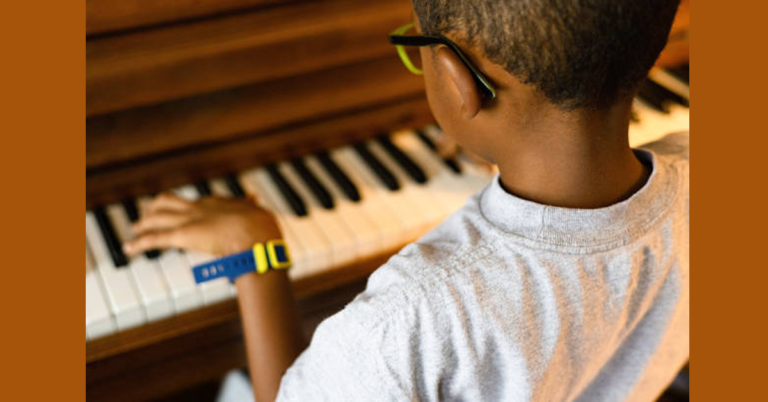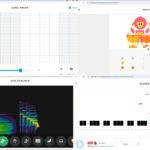Music has a significant impact on our lives, crossing cultural, linguistic, and age barriers. The advantages of learning to play a musical instrument for youngsters extend far beyond the field of music itself. In this article, we will look at how participating in musical activities might help child development and an overall academic achievement.
1. Improved Cognitive Skills in Child Development
Learning to play a musical instrument is like giving your brain a full-body workout. It entails the coordination of several cognitive activities, including memory, attention, and problem-solving. Children who play instruments have better memory retention, enhanced spatial-temporal skills, and improved mathematical abilities, according to studies. In child development, playing an instrument can strengthen the connections between different areas of the brain, enhancing overall brain function. It is crucial to remember that the cognitive benefits of playing a musical instrument vary depending on the level of commitment and practice. Consistency and dedicated practice produces more significant cognitive benefits.
2. Enhanced Language in Child Development
Music is its own language, and learning to read musical notation is similar to learning a new language. Decoding symbols and translating them into sound can improve child development, especially linguistic abilities. It can help you enhance your reading comprehension, vocabulary, and even your pronunciation. Experimenting with different rhythms and melodies also helps to create a stronger sense of phonological awareness. Musicians frequently have stronger verbal memory, which can help with vocabulary learning and retention. It is worthy to note that musicians hone their listening abilities, which are necessary for understanding and interpreting spoken language.

3. Increased Concentration and Discipline in Child Development
It takes a lot of commitment and discipline to master an instrument. In children, regular trainings give them a sense of commitment and control over their time. The discipline can become an intrinsic part of the student’s academic pursuit which helps them focus, complete tasks in a timely manner and prevent procrastination. Musical training improves the ability to distinguish minute sound changes, which can benefit in the development of phonemic awareness, which is also essential for language and reading.
4. Stress Reduction and Emotional Intelligence in Child Development
Music is a powerful emotional outlet. Learning to express themselves through music can help children manage stress and anxiety. Additionally, playing in groups promotes social interaction, empathy, and team spirit. These emotional intelligence skills are valuable not only in personal relationships but also in the classroom.
5. Mathematical and Analytical Skills in Child Development
It’s no secret that music and math go hand in hand. Things like rhythm, pace, and meter are all based on math. Rhythm is essential in music, and it is determined by time signatures. These time signatures, which indicate the partition of musical time into equal parts, are stated as fractions such as 4/4 or 3/4. This is a logical concept. Musical harmony is founded on the mathematical correlations between frequencies. For example, two notes with frequencies in a simple ratio, such as 2:1 (an octave), sound consonant and harmonious. Musical scales are built with mathematical ideas. The equal tempered scale, for example, divides the octave into 12 equal pieces, each equivalent to a semitone.
Logarithmic mathematics is used in this division. Some composers have structured their compositions or rhythms using mathematical notions such as the Fibonacci sequence. This sequence appears in nature and has been used in music creation. It starts with 0 and 1 and each following number is the sum of the two preceding ones. Composers now generate music using mathematical algorithms thanks to advances in technology. Based on mathematical rules and parameters, algorithms can build complicated composition.
The Fourier transform is a mathematical technique used in digital music processing to analyze and alter sound waves, which aids in tasks such as audio reduction and synthesis. Music theory includes mathematical concepts like intervals, chords, and key signatures, which are based on numerical correlations between musical elements. When kids learn to play a musical instrument, they’re actually learning math without even knowing it. While learning music, they are mastering the basic principles of mathematics in a fun way. It can help them learn how to solve problems and understand abstract math.

6. Enhanced Memory and Pattern Recognition in Child Development
Recognizing and reproducing musical notes, patterns and sequences is an important part of learning to play musical pieces. This practice builds a child’s memory capacity. Furthermore, the capacity to identify and reproduce musical patterns can lead to enhanced pattern recognition abilities in other areas of study, such as mathematics, science and computer programming. Playing an instrument requires precise finger motions and coordination, which can aid in the development of fine motor skills required for writing and other language-related activities.

7. Boost in Self-Esteem and Confidence in Child Development
Achieving proficiency in the musical instrument is a major accomplishment for any child. Learning and performing music can have a positive impact on a child’s self-esteem and self-confidence. This confidence is often transferred to other aspects of their life, such as their academic performance. Musical expression and creativity can enhance confidence and encourage self-expression, thereby boosting communication abilities.

Conclusion
Making music a part of your child’s life can be a game-changer for their academic performance. Learning to play a musical instrument can help your child develop cognitive abilities, language skills, focus, and emotional intelligence. In addition, the discipline, math skills, and self-confidence that come with playing a musical instrument can set your child up for success in life.
Engaging children in musical activities is not only about fostering their artistic abilities; it is also about providing them with a foundation of skills that will enable them to excel in both academic and extracurricular activities. Therefore, regardless of the type of instrument, whether it be a piano, a violin, or a guitar, let the music be played, as it harmonizes the mind and soul of a child.
Do you want to start Your Child’s Musical Development?




